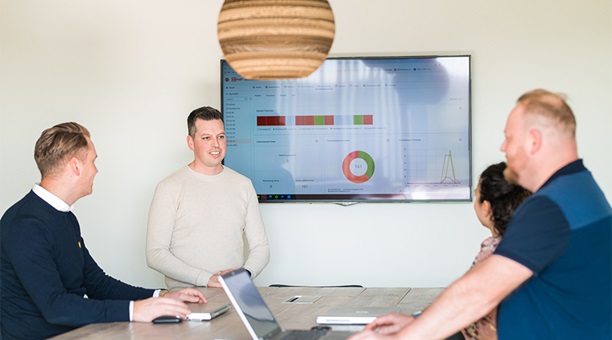COE Waste Management
Renewi is in the process of transforming from a waste collection (mainly logistics) company to a supplier of secondary materials. The sorting and processing of residual flows plays a major role in this. Especially in this last area, automation is in its infancy. At the same time, we still use a lot of paper and work is done manually. We are in the process of automating this.
The main goal of the COE Waste Management is, on the one hand, to execute projects in an Agile way and to ensure that the applications keep running. And on the other hand, it is Thought Leadership.
If you look at Renewi, we have Waste Collecting, Sorting, Processing, and Product Sales. The COE Customer Engagement is responsible for everything that has to do with the customer. Once something becomes an order, it is a responsibility of the COE Waste Management. It includes things like the Onboard Computers in the trucks, planning the routes and interfacing with the weighbridge. And then you end up with sorting and processes, where all sorts of logistical processes play a role. It is a broad COE that really deals with process technology but also with modern developments such as Artificial Intelligence. For example, we are experimenting with cameras on the back of trucks to see what is in a container that we pick up. We are also linking IOT (Internet of Things) devices to bins so that we can see where they are and how often they need to be emptied.
Our ambition is to grow into one way of working. This applies not only to the Dutch sites but also to the Belgian and United Kingdom sites. We want to harmonise within Commercial Waste. Renewi has grown in recent years through acquisition. We buy companies that all have their own way of working and we want to standardise that.
Over the next few years, we are also going to build a completely new digital core that will house all the processes surrounding the operation, and we want to transfer the finance processes in a standardised manner. Data also plays a major role, because you can learn a lot from information.
We want to digitise our customer, but we also want to digitise our internal customer. One of the steps, for example, is digital acceptance. For instance unmanned weighing. When a truck comes to a weighing station, the number plate is automatically scanned, and we automatically sort out the contract. The digitalisation of such a contract is one of the typical things that fall into this category. And by having an unmanned weighbridge you can also change your opening hours. Then you say: during peak hours we do have someone at the weighbridge, that if you want to bring something in without a contract you can come in then too. But beyond those hours an unmanned weighbridge can be used. This is not only an efficiency gain, but also provides better services to the customer.

What kind of people are we looking for?
We are in the process of making strides towards digitalisation. We are looking for people who have experience working in the cloud, with data, but also the combination of AI and industrial experience. Can you use digital concepts to generate practical solutions? For example, we now have thermal cameras that continuously monitor the heat of our waste streams to prevent fires from breaking out. You can do a lot more with these kinds of things.
We are looking for people with innovative minds. We want to try everything and if it works well, we can use it. Drones, robots, cameras, but also apps. It is all about demonstrating the value of technology.

